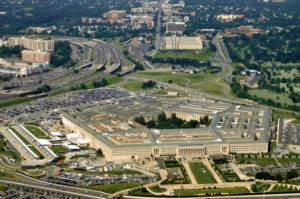While Emily Murphy, Pres. Trump’s political appointee who heads the General Services Administration has not yet signed a letter permitting access to government files and funds to ease the transition for Pres.-elect Joe Biden, an informal transition process has started, an official at the Center for a New Amercian Security (CNAS) said on Nov. 9.
“Despite this hiccup, the Trump administration has actually been a pretty good steward of the Presidential Transition Act,” said Loren DeJonge Schulman, a adjunct senior fellow at the Center for a New American Security (CNAS) and a former senior adviser to Susan Rice, who was President Obama’s national security adviser.

“Agencies have been preparing for a responsible transition for the past few months in the same way that they did in 2008 and 2016, and in some ways, better, given new authorities and new support that they’ve had over the last six months or so,” she said. “At the same time, the Biden team has one of the most extensive transition apparatus in history. They’ve been doing their own preparation, their identification of agency review teams, [and] the kind of questions they’ll need to work on and can only work on over the next few months.”
“Even if we’re a little late in getting started, we are well ahead of where we have been in the past in [the year] 2000 or so,” Schulman said. “One of the reasons that we have the Presidential Transition Act requirements that are set up today is because the 2000 transition was delayed due to the [U.S. Supreme Court] decision of Bush v. Gore. As a result, a lot of positions were not filled until late in the Bush administration. There was a lot of speculation that if we had more time in that transition for people to be prepared, for personnel to get in place, that you would have had a better prepared team for 9/11.”
Besides the refusal thus far of Murphy to sign a GSA transition letter, Trump fired Defense Secretary Mark Esper on Nov. 9–a termination that may further delay an orderly transition.
“There are two periods of time that we need to think about,” said Carrie Cordero, the Robert M. Gates Senior Fellow at CNAS and a former senior associate general counsel at the Office of the Director of National Intelligence.
“One is the post-Jan. 20 [time period] once we have a new Congress and a new administration in place and the opportunities that might exist for bipartisanship on certain issues, things like China and tech issues,” she said. “And then there are areas, like homeland security where the partisanship has been so corrosive that there’s going to be a lot of work to do to bring consensus.”
“I’m more concerned about the next 70 plus days and the importance of some beginning steps of bipartisanship,” Cordero said. “We now will have an acting secretary of defense through the transition period. Hopefully, the work that the staffs have been doing in our government agencies and in the transition team have been laying the groundwork for an effective transition, but all indicators are that the president is going to create as much chaos as he can during this period. This moment is a moment where if there are any members of Congress who are looking for an opportunity to pause the corrosive partisanship and bolster the institutions and the ability for this transition to be conducted effectively in a way that shows that our institutions can still function effectively during this transition period, this is the moment for it.”